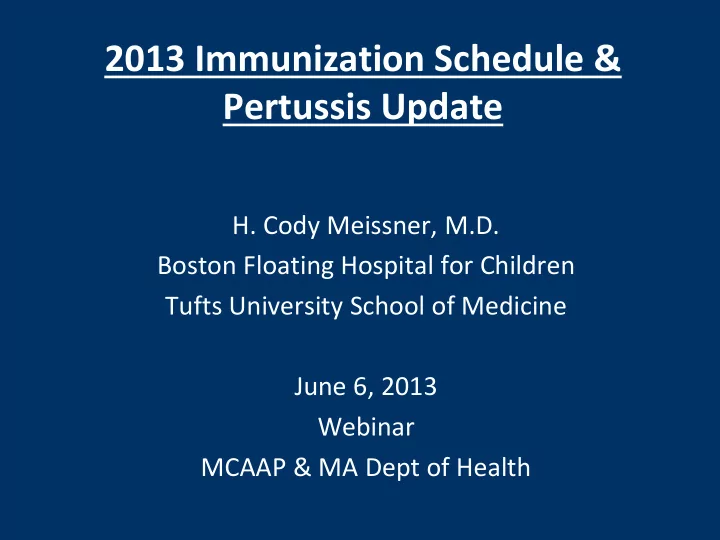

2013 Immunization Schedule & Pertussis Update H. Cody Meissner, M.D. Boston Floating Hospital for Children Tufts University School of Medicine June 6, 2013 Webinar MCAAP & MA Dept of Health
Disclaimers/Disclosures • I have no relevant financial relationships with the manufacturer(s) of any commercial product(s) and/or provider of commercial services discussed in this CME activity. • I do not intend to discuss an unapproved/investigative use of a commercial product/device in my presentation.
Licensed Vaccines in United States Routine childhood use: Special settings: • Adenovirus • Diphtheria, tetanus, pertussis • Anthrax • Haemophilus influenzae type b • Bacille Calmette-Gu é rin (BCG) • Hepatitis A • Herpes zoster (shingles) • Hepatitis B • Japanese encephalitis virus • Human papillomavirus • Rabies • Influenza • Typhoid • Measles, mumps, rubella • Vaccinia (smallpox) • Meningococcal • Yellow fever • Pneumococcal • Poliomyelitis • Rotavirus • Varicella
Bordetella pertussis Major Antigens and Virulence Factors Pertussis toxin (PT), also known as lymphocytosis- promoting factor (LPF) Filamentous hemagglutinin (FHA) Pertactin (PRN), also known as 69 kilodalton protein Fimbrial agglutinogens (FIM)
Illness due to B. pertussis is Unique • Difficult to recognize and diagnose because of atypical symptoms • Only major infectious disease not associated with fever • Symptoms in adults & adolescents may be non-specific • Between paroxysms of cough there are no abnormal physical findings • Infants may present with respiratory distress & apnea • Only respiratory infection in children that is more common in girls and more often fatal in girls • Immunity after infection or immunization is short-lived • People with pertussis can be contagious for up to 3 weeks • Contagious for up to 5 days after starting treatment • Diagnostic tests may not be readily available
Reported Pertussis Cases – 1922 – 2010 30,000 300,000 20,000 250,000 DTwP Number of cases 10,000 200,000 0 150,000 1990 1995 2000 2005 2010 100,000 Tdap DTaP 50,000 0 1922 1930 1940 1950 1960 1970 1980 1990 2000 2010 Year SOURCE: CDC, National Notifiable Diseases Surveillance System and Supplemental Pertussis Surveillance System and 1922-1949, passive reports to the Public Health Service
Pertussis Deaths U.S., 2000-2009 Younger than 3 3 Months and Total Months Older 175 19 194 (90%) (10%)
Possible Explanations for Increase in Reported Pertussis (Reasons why DTwP, DTaP, Tdap vaccines fail) • Greater awareness & reporting of pertussis – Increased surveillance • Waning vaccine induced immunity • Acellular vaccine less potent than whole cell vaccine – DTwP efficacy > DTaP • Availability of better diagnostic tests – Culture, serology, PCR • Genetic changes in B. pertussis • True increase in disease burden
Initial DTaP series • Routine vaccination: – Minimum age 6 weeks – Administer a 5 dose series at 2,4,6 and 15-18 mon and 4-6 yrs – 4 th dose may be administered as early as 12 mon if at least 6 mon after 3 rd dose – 5 th (booster) dose not indicated if 4 th dose administered at ≥4 yrs
Tdap Vaccines: licensure & composition Trade Name, Age PT FHA PRN FIM Diphtheria Tetanus Manufacturer approved 2&3 µg µg µg Lf Lf for use µg 11 – 64* Adacel 2.5 5 3 5 2 5 (Sanofi Pasteur) Boostrix 10 and 8 8 2.5 _ 2.5 5 older* (GSK) PT - pertussis toxin; FHA - Filamentous haemagglutinin; PRN - pertactin; FIM – fimbriae * 7 years and above
Use of Tdap Among Children 7 Through 10 Years of Age • Children 7 through 10 years of age who are not fully vaccinated against pertussis and who do not have a contraindication to pertussis vaccine should receive a single dose of Tdap • Either brand of Tdap may be used • Fully vaccinated at 7 years if: – 5 doses of DTaP or – 4 doses of DTaP if the fourth dose was administered on or after the 4 th birthday
Percent of Pertussis PCR Positive tests by Vaccine Type for 1 st 4 doses (2010-11) Pediatr 2013;131:e1716
Current Recommendations for Tdap • A single Tdap dose – Adolescents aged 11-18 years, preferred at 11 or 12 yrs – Adults aged 19 and older with focus on: • Pregnant women are recommended Tdap with every pregnancy • Health care professionals • Parents & siblings • Relatives ≥65 yrs – Further guidance will be forthcoming on timing of revaccination in persons who have received Tdap previously • No minimal interval from prior Td • Decennial Td booster for those who received 1 Tdap – 5 yrs for wound management
Use of Tdap Among Adults 65 Years of Age or Older • Adults 65 years of age and older who previously have not received Tdap, should receive a single dose of Tdap • When feasible, Boostrix should be used for adults 65 years of age and older • Administer Adacel if Boostrix is not available
Tdap Recommendations for Pregnant Women • Administer Tdap to pregnant adolescents and adults during each pregnancy – preferably during 27- 36 weeks’ gestation – regardless of number of yrs since prior Td or Tdap • If not administered during pregnancy, Tdap should be administered immediately postpartum
Precautions & Contraindications to Vaccination • DTaP Contraindications • Severe allergic reaction (anaphylaxis) • Encephalopathy within 7 days not due to other cause • Children <1 yr with evolving neurologic disorder Precautions • Moderate or severe acute illness • Temperature ≥40.5ᴼC within 48 hr • Hypotonic, hyporesponsive episode within 48 hr • Persistent, inconsolable crying lasting ≥ 3 hr • Convulsions within 3 days • Tdap Contraindications • Severe allergic reaction • Encephalopathy within 7 days not due to other cause Precautions • Moderate or severe acute illness • Guillain-Barré syndrome within 6 wks • Progressive neurologic disorder • Severe Arthus reaction
Recommend
More recommend